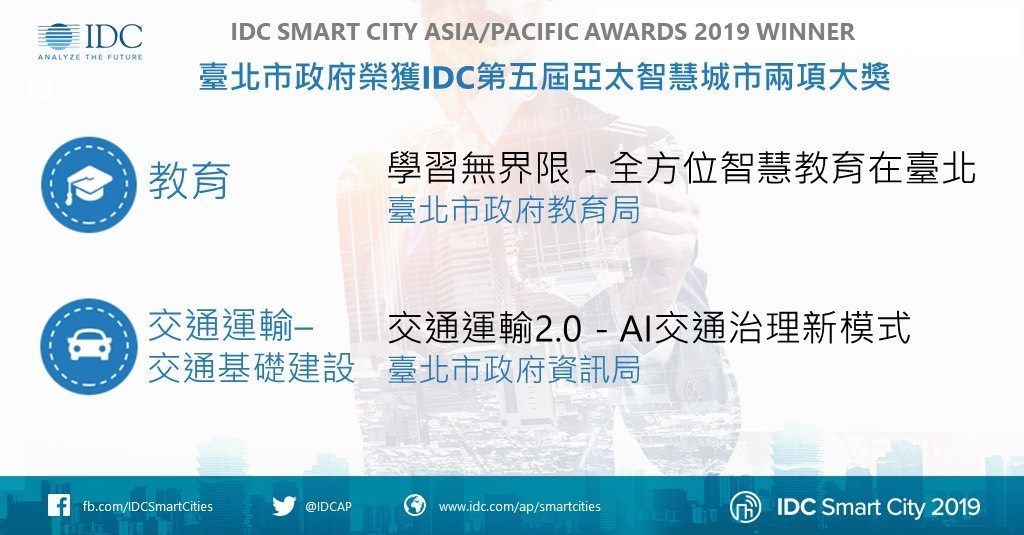Smart City Awards Galore! Taipei Wins SCAPA Awards in Transportation and Education Category
 The International Data Corporation (IDC) – an international marketing research institution - recently announced the list of winners for the 2019 Smart City Asia Pacific Awards (SCAPA), and Taipei City Government stood out from the competition with 170 smart city innovation projects, winning 2 major awards with Transportation 2.0 – AI Driven Transportation Management and Cross Learning Barriers: Omni Smart Education. With such international recognition, Taipei has established its global reputation as a smart city brand.
The International Data Corporation (IDC) – an international marketing research institution - recently announced the list of winners for the 2019 Smart City Asia Pacific Awards (SCAPA), and Taipei City Government stood out from the competition with 170 smart city innovation projects, winning 2 major awards with Transportation 2.0 – AI Driven Transportation Management and Cross Learning Barriers: Omni Smart Education. With such international recognition, Taipei has established its global reputation as a smart city brand.
Since the city government invested in building a smart city and implemented relevant projects, it has repeatedly won awards in global smart city competitions. For example, it was voted the Intelligent Community of the Year at the Intelligent Community Forum (ICF) in 2006 thanks to the application of technology and full support and promotion from the government; in 2017, Taipei City received the Cooperative City Gold Award (first place) at the 3rd WeGO Smart Sustainable City Awards with Taipei Smart City Living Lab – Government as a Platform; in 2018, Taipei City was ranked 16th out of 140 smart cities in the world and 5th in Asia in the Top 50 Smart City Governments ranking by Singapore’s Eden Strategy Institute. In the future, more convenient services will be introduced for the citizens to further increase Taipei City’s international competitiveness.
This year, Taipei City Government exhibited a remarkable performance on the international stage by winning the 5th Smart City Asia Pacific Awards (SCAPA) with Transportation 2.0 – AI Driven Transportation Management and Cross Learning Barriers: Omni Smart Education, indicating that Taipei City’s smart services have demonstrated exceptional benefits to endow the city government with enormous encouragement and confidence. According to the Department of Information Technology (DOIT), Transportation 2.0 – AI Driven Transportation Management combines innovative technology with transportation to let citizens enjoy smart transportation services; besides the application of various technologies to the city’s infrastructure, the data generated is analyzed, calculated and integrated with the backend platform. In addition, the city’s traffic surveillance images are used in AI analysis to monitor traffic, vehicles, traffic accidents, transportation needs, and parking space vacancies in quickly and accurately.
According to the DOIT Commissioner Lu Hsin-ke, various dimensions of smart city development require the gathering and analysis of big data; therefore the department has applied the technical guidance approach to help different bureaus and departments to digitize their data for a wide range of applications, accumulating experiences in smart city development during the process. Taipei Smart City Project Management Office, on the other hand, has utilized its core policies to consolidate internal, external organizations with the public and private sector to create the platform ecology. By pooling the resources of the private sector and society, as well as the opinions of industries, academia, and research institutions, the target of becoming a livable, sustainable smart city will be realized.
Taipei is a smart city brimming with opportunities; therefore the aim is to combine the city’s infrastructure with smart services to transform the city into a living lab for interested industries to conduct experiments and expose citizens to more smart services. Winning the special honor is the manifestation of Taipei’s prowess and competitiveness in information technology that not only encourages the advancement of Taiwan’s smart city industry, but also attracts more domestic and foreign industrial, academic and research organizations to pursue innovative development in Taipei City, using Taipei Smart City as the brand to foster international collaborations.

![Taiwan.gov.tw [ open a new window]](/images/egov.png)
